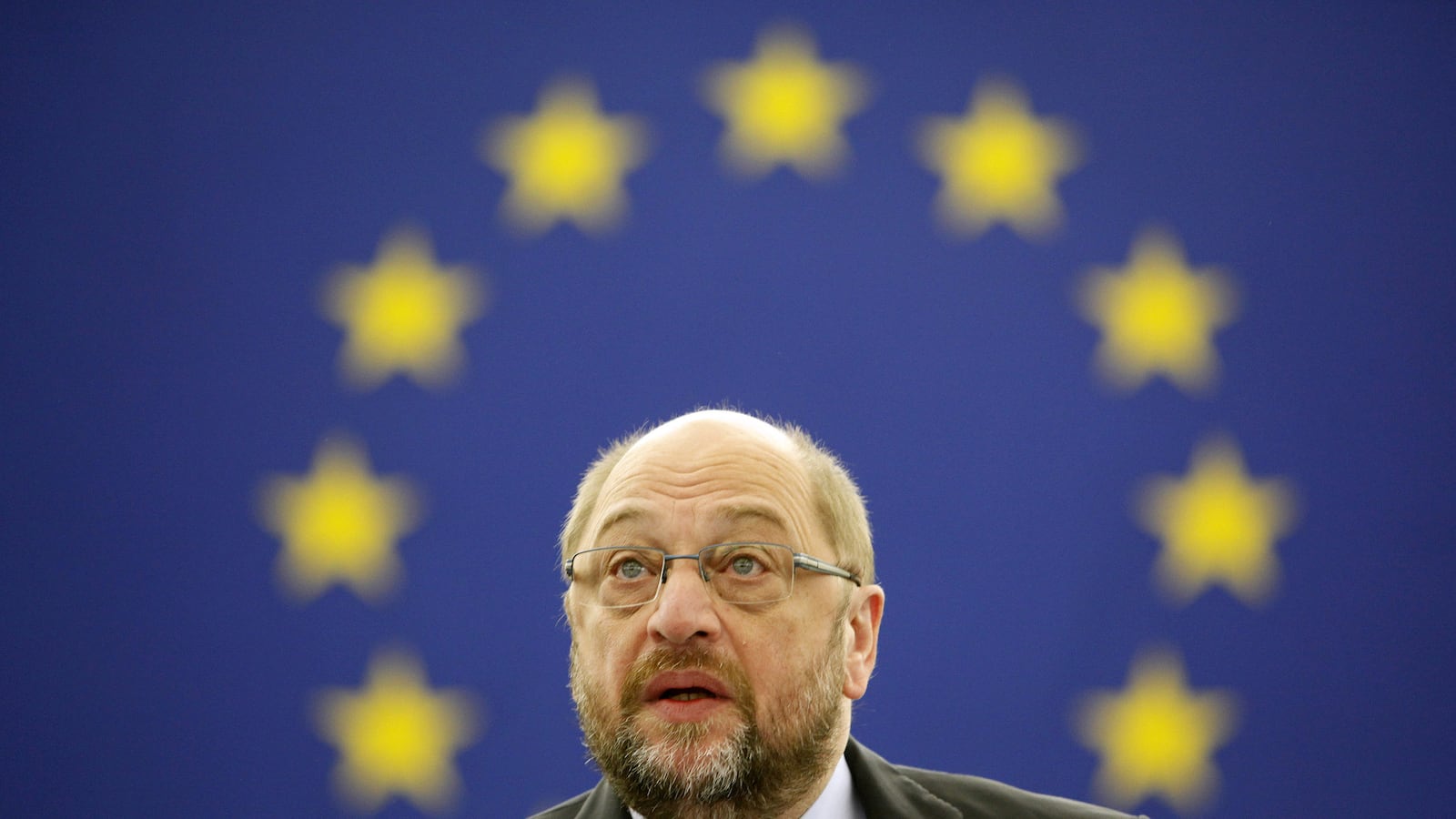LUBECK, Germany—Was there ever a time when Angela Merkel was not Germany’s chancellor? After someone’s been there for more than 11 years, it starts to get hard to remember. Merkel is more than a leader, she has become an icon, from the color and cut of her hair to the downturned corners of her mouth and, yes, her signature stiff blazer.
So, when Martin Schulz, her leading opponent, announced to a packed hall in the city of Lübeck, “I’m going to take off my jacket, it’s too warm in here for me,“ everybody got the joke. He added, casually, “I may have been president of the European Parliament for five years, but etiquette still isn’t really my thing.”
Relaxed and smiling, Schulz is winning over voters bigtime in these early days campaigning for the German elections set to take place in September. The possibility he’ll defeat Merkel now looks quite real. And in Europe’s poisonous political season, his humor and his charm are being welcomed across the Continent as a kind of antidote to the rising stars on the right, most notably in the Netherlands and in France, where the candidates with momentum are xenophobic ultra-nationalists whose platforms are built on the idea that immigrants should be kept out, and the European Union as we know it should be brought down.
In Germany, those ideas have gotten publicity, but not much traction. And whether the 62-year-old Merkel wins or the 61-year-old Schulz, the German chancellor named in September is going to have a tough fight against Trumpian bigotry and isolationism infecting politics in the United States and among Germany’s immediate neighbors. Indeed, there has been a lot of talk about Merkel as “the new leader of the free world,” which is not entirely off base. But it’s looking like over the long run that job could just as well fall to Schultz.
***
It’s now four weeks since the choleric, overstretched (soon to be father of three) Sigmar Gabriel made Schulz a last-minute offer to run in his place as the candidate for chancellor from the center-left Social Democrats (SPD)—a party which only a few months ago was still being sneered at as the “depressed“ junior partner of Merkel’s ruling coalition.
“I want to win,” Schulz then announced firmly on national television. Against “Mutti“ Merkel? “Do you have a tendency to over-estimate yourself?“ his interviewer asked, smiling.
But look! In what is being hyped as the “Schulz-effect,” the SPD is narrowly shooting ahead of Merkel’s Christian Democrats (CDU) in the polls for the first time in a decade. The latest opinion survey by the Emmid Institute for Bild am Sonntag had the SPD one point ahead of the CDU and its sister party, the CSU.
The #Schulzzug (Schulz crusade) is not just a godsend for the SPD, but also a problem for the far right. In previous elections, Merkel’s predictable superiority hasn’t made for the most exciting competition between the two main parties, thus amplifying the media spotlight on smaller upstart parties. But this time, parties like the AfD will be more likely to lose out on coverage and votes.
Schulz, who belongs to the more conservative wing of the SPD, has been dismissed by some as “Merkel with a beard“ (he supported her open-door refugee policy, otherwise much of his stance on foreign and security policy is unclear). But he presents himself as her opposite: an outsider who is passionate and emotionally available. And that’s exactly how much of the German public, to whom he appears fresh off the plane from Brussels, is willing to see him.
Now touring Germany under a banner titled, “Time for more fairness, time for Schultz,” he took a moment in his Lübeck address to talk about a personal slight that he read in the papers: No, he didn’t finish secondary school. “I don’t have a straight path behind me,” he explains. “I know from my own experience that a path can be rocky, and arduous, and I know what it’s like to lose one’s way.”
Is he referring to his early struggle with alcoholism after an injury ended his dreams of becoming a professional soccer player? To the night in 1980, when, at the age of 24, he sat at his desk at 4:00 a.m. in the morning and contemplated taking his life? Possibly. And the audience’s reaction? Voll krass—he really knows how to talk.
Suddenly, people all over the country are swarming to join the SPD again—including those who had left in protest years ago. Former SPD leader Gerhard Schröder’s labor reforms (known as Agenda 2010) often are credited with turning Germany from “the sick man of Europe” to its strongest economy. But Agenda 2010 was received as an act of betrayal by much of the party’s working class base.
At a worker’s conference in Bielefeld on Monday, Schulz was given a shot at redemption when he stood on stage with a wheelbarrow and the cleaning cart as props. He promised corrections to Agenda 2010, saying, “When mistakes are recognized, they must be corrected.” And his criticisms of fixed-term work contracts and restrictions on unemployment benefits came across as credible—he wasn’t in the country when the divisive reforms were passed in the early noughties.
***
A young man named Kai Fuhrmann, who spends his weekends handing out fliers for the far-left Left Party, tells The Daily Beast that to him the SPD is still the same bunch of traitors that they were over a decade ago.
Even so, he says, “I would vote for Schulz to oust Merkel, she’s been around for long enough.” And also because Schultz, if the votes add up, may enter into a ruling coalition with the Green party and the Left Party? “Sure.“
Hajo Funke, an expert on Germany’s far right, believes that Schulz may be better suited than Merkel to win back voters from the AfD, despite being further to the left: “There is a relatively big group of people who support the AfD out of social insecurity. They’ve felt that there was a lack of alternative, that the AfD is the only party that would do something to help them.”
Back in Lübeck, towards the end of his talk, Schulz seemed to lose his train of thought, paused, then lowered his voice and murmured. “You could invite me to a local soccer match here.“ This was greeted with roars of excitement. Poor Merkel had to work a lot harder to convince Germans that she was genuinely a fan of the game.
No wonder then, that the several politicians from the CDU, which was expecting an easy win this September, are getting anxious and losing a bit of their perspective. Last week Merkel’s formidable finance minister, Wolfgang Schäuble, actually accused Schulz of being “a Trump.“ This week, the conservative minister of the state of Hesse indirectly revived the bizarre comparison when he told the Tagesspiegel that Schulz was making claims that were “practically all false.“
In 2012, while driving around in Schulz’s home town, Würselen, a Spiegel reporter asked Schulz, who had just been elected president of the European Parliament, if he plays golf. Schultz was irritated. “For god’s sake,“ he said. “I’m actually a little pleb.“
And then there are people whom Schultz can’t quite win over yet. “Get to the point!“ one man named Jan-Marco Hill yelled from the back of the hall in Lübeck, when Schulz told a story about his time at the European Parliament. (A Greek MEP, whom Schulz had thrown out for racist remarks, asked him: Do you love your fatherland? Schulz replied: I love my wife!)
As audience members started drifting off, back to their cars and to the coffee area, Hill continued to stand with his arms folded, watching Schulz shaking hands by the podium.
Hill told The Daily Beast that he worked at the Lübeck port for 15 years. After being laid off, he tried to open a cafe. The cafe went bankrupt. Hill is now unemployed and seriously in debt to his municipal council. He says that the job centers don’t take him seriously, and that his wife has just left him after 24 years of marriage.
“I’ve been influenced by the Social Democrats a lot in the past,” he says. “But for me today was just rhetoric.”
If Schulz is going to win in the end, he will have to do more than take off his jacket. He’ll have to roll up his sleeves.






